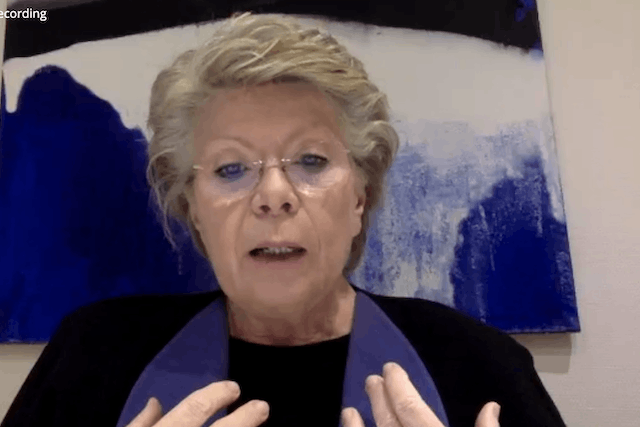During the American Chamber of Commerce (Amcham) webinar, chairman Paul Schonenberg highlighted the “deep, historic ties” between the two nations, from immigration in the 19th century and since, to the US helping in the industrialisation and rebuilding of Luxembourg post-World War II with the Marshall Plan, to the current economic bilateral investments and tech and space activities.
Given Monday’s confirmation by the US electoral college of Joe Biden as 46th president of the US, Schonenberg asked: where are the two countries headed?
“Relieved” about results
Reding compared the bilateral relationship between the US and Luxembourg to “a long-lasting love story. Even the changing politics cannot change it and cannot make it look worse than the beauty that it has.”
While she added “we are very relieved” about the electoral college formalising the US presidential election results, she recognised that Biden will likely focus on internal affairs first but that “now, after years of uncertainty for Europe, we hope relations go back to normal… for Europe [the] transatlantic cooperation, based on shared interests and values, has suffered in the last years. Now we can rebuild.”
The European Commission has already proposed plans to get this dialogue underway, including a green trade agenda and better cooperation and free flow when it comes to data.
“The one who controls the technology world controls the world,” Reding commented, and she called for a “convergence on a rule-based tech governance”. She hopes to see more of a collaborative approach with friends and allies, but sees issues like climate change, politics and Nato and the world of technology as “interlinked” and requiring “a coherent policy. I would prefer we do this coherent policy in future with the US. For achieving this, Luxembourg will be in the driving seat.”
China is a “European problem”
Ambassador Evans, who announced he will be leaving his post in January, spoke of the space MoU signed between the US and Luxembourg in 2019, which laid the groundwork for and culminated in Luxembourg’s signing of the Artemis Accords. Indeed, throughout his tenure, Luxembourg has seen some of the largest US delegations arrive in the grand duchy, including those here for the 75th Battle of the Bulge commemoration and the Organisation for Security and Cooperation in Europe parliamentary assembly last year, to this year’s space delegation.

US ambassador to Luxembourg Randy Evans announced he will be leaving in January 2021. Webinar screengrab
But his biggest accomplishment, he says, was “to help the leaders in the US--in both parties--understand that Luxembourg exists, [it] is important, [it] is a leader and [it] can help the entire world solve problems that we never dreamed of.” But the ambassador expressed his concerns in the tech space with regards to China.
“There’s no greater theft occurring today than the Chinese stealing…technology,” Ambassador Evans said. “[And] we can’t even get from the EU a condemnation on the theft of intellectual property.”
He added that when he speaks to US businesses about investing in Luxembourg, “the first question they have is, what protection do they have.” With Chinese investment or seats on boards, for example, he says companies are concerned “China has all our technology, no matter how innovative it is…every company in Luxembourg, especially those in financial transactions, should worry about malware, theft of IP, losing that which they’ve worked so hard for… [They also] create competitors, which then put Luxembourg companies out of business… this is not a Luxembourg problem, it’s a European problem.”
While Reding acknowledged the situation in Hong Kong and Taiwan, as well as the developments in the South China Sea being “worrying”, she hopes to see Americans making more agreements with Asian countries, adding that things should not be seen in a simplistic way, rather that different elements are reviewed for a better, more proactive approach. This can be better achieved, for example, “in having giant defence capability on the digital development, that’s what America and Europe have to do much more [of] in future.”
Reding hopes to see the new US administration sit down soon with the EU Commission to build tech and defence capability and advancement, also in AI.
“If [the US and EU] join forces, we make the rules of the future, and it will be rules based on our values [and] those continents start to build on these value-based rules and develop standards for the future,” Reding added. “If we have done that, any threat which could come from China would be lessened.”
Vaccination concerns
Ambassador Evans also brought up the vaccination rollout already taking place in the UK and US and questioned how long it will be until Luxembourg gets the vaccine, asking, “How many will die in meantime?”
Reding explained the European Medicines Agency (EMA) has its own review process and will decide on the Pfizer-Biontech vaccine on 21 December.
“Luxembourg is ready, the moment we have the go of the EMA,” she said, “but we wait for the security of vaccines…because of our people, their security and health.”
